-
 Bitcoin
Bitcoin $86,989.5773
2.47% -
 Ethereum
Ethereum $1,907.7486
-0.28% -
 Tether USDt
Tether USDt $0.9998
0.00% -
 XRP
XRP $2.1782
1.30% -
 BNB
BNB $605.9725
-1.07% -
 Solana
Solana $130.9318
2.03% -
 USDC
USDC $0.9997
-0.03% -
 Dogecoin
Dogecoin $0.1757
1.47% -
 Cardano
Cardano $0.6948
1.08% -
 TRON
TRON $0.2378
0.79% -
 Toncoin
Toncoin $4.0441
0.19% -
 Chainlink
Chainlink $14.1226
-0.93% -
 UNUS SED LEO
UNUS SED LEO $9.3952
0.65% -
 Stellar
Stellar $0.2737
-1.37% -
 Avalanche
Avalanche $19.7700
-0.01% -
 Sui
Sui $2.4853
0.25% -
 Shiba Inu
Shiba Inu $0.0...01283
-0.56% -
 Hedera
Hedera $0.1728
-0.67% -
 Polkadot
Polkadot $4.2112
-0.14% -
 Litecoin
Litecoin $86.0983
1.27% -
 Bitcoin Cash
Bitcoin Cash $312.1520
-0.42% -
 MANTRA
MANTRA $6.3442
0.01% -
 Bitget Token
Bitget Token $4.6044
-0.33% -
 Dai
Dai $0.9999
0.00% -
 Ethena USDe
Ethena USDe $0.9999
0.00% -
 Hyperliquid
Hyperliquid $14.0809
4.33% -
 Pi
Pi $0.6847
-3.43% -
 Monero
Monero $219.9574
0.86% -
 Uniswap
Uniswap $6.2581
0.04% -
 Pepe
Pepe $0.0...07858
1.61%
How to use virtual machines for cryptocurrency mining?
VMs offer isolation for crypto mining but come with performance overhead; profitability varies based on setup, cryptocurrency, and hardware.
Mar 29, 2025 at 11:57 pm
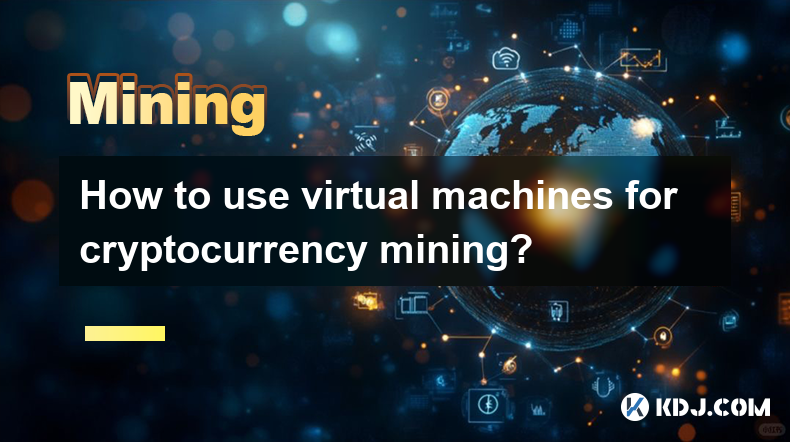
Virtual machines (VMs) offer a potentially appealing environment for cryptocurrency mining, providing isolation and flexibility. However, their effectiveness is heavily debated and depends significantly on your specific setup and chosen cryptocurrency. This article explores the practicalities and limitations of using VMs for mining.
Understanding the Challenges and Benefits
Using a VM for cryptocurrency mining presents both advantages and disadvantages. The primary benefit lies in isolation. A VM allows you to run mining software without directly impacting your host operating system. This protects your main system from potential malware or instability associated with mining software. Furthermore, VMs allow you to test different mining configurations and operating systems without needing multiple physical machines.
However, the significant drawback is performance overhead. Virtualization introduces a layer of abstraction, leading to performance losses compared to running mining software directly on the host operating system. The hypervisor managing the VM consumes system resources, reducing the available processing power and memory for mining. This can significantly impact your mining profitability. The extent of this performance hit depends on the virtualization software, the host hardware, and the VM configuration.
Choosing the Right Virtualization Software
Several virtualization software options exist, each with varying performance characteristics. Popular choices include VMware Workstation Player, VirtualBox, and Hyper-V. The optimal choice depends on your operating system and hardware. Consider the performance overhead of each option before making a decision. Some hypervisors are known for their efficiency, while others might impose a greater performance penalty on your mining operations. Research benchmarks and user reviews to guide your choice.
Setting Up Your Virtual Machine for Mining
Setting up a VM for cryptocurrency mining involves several steps:
- Install a suitable virtualization software: Choose a hypervisor based on your host OS and performance requirements.
- Create a new virtual machine: Allocate sufficient resources (CPU cores, RAM, and disk space) to your VM. Over-allocating resources can negatively impact your host system's performance. Under-allocating resources will severely limit the VM's mining capabilities.
- Install a compatible operating system: Select an OS known for its mining software compatibility, often a lightweight Linux distribution like Ubuntu or a specialized mining OS.
- Install mining software: Choose a miner compatible with your chosen cryptocurrency and the VM's resources. Configure the miner according to the software's instructions.
- Configure network settings: Ensure your VM has network access to connect to mining pools.
Remember that the amount of resources allocated to the VM directly impacts its mining efficiency. Experimentation is key to finding the optimal balance between VM performance and host system stability.
Hardware Considerations
The success of VM-based mining heavily relies on your host machine's hardware. A powerful CPU, ample RAM, and a fast storage solution (preferably an SSD) are crucial for minimizing performance bottlenecks. Insufficient hardware resources will severely limit the VM's mining capabilities, potentially rendering the endeavor unprofitable.
The type of cryptocurrency you mine also influences your hardware needs. Some cryptocurrencies are more CPU-intensive, while others require powerful GPUs. If you intend to mine GPU-intensive cryptocurrencies, consider using a virtualized GPU passthrough if your hardware supports it. This allows the VM to directly access your GPU, bypassing the performance limitations of software-based GPU virtualization.
Software Considerations
The choice of mining software is critical. Different miners have varying levels of efficiency and resource utilization. Research and select a miner optimized for your chosen cryptocurrency and hardware. Ensure the miner is compatible with your chosen operating system and VM environment. Regularly update your mining software to benefit from performance improvements and bug fixes.
Network Considerations
A stable and high-speed internet connection is essential for efficient mining. The communication between your VM, the mining pool, and the blockchain requires significant bandwidth. Network latency can significantly impact your mining profitability. Consider using a wired connection for maximum stability and speed. Furthermore, ensure your network configuration allows the VM to access the internet without restrictions.
Security Considerations
Running mining software, even within a VM, presents security risks. Always download mining software from official sources to avoid malware. Regularly update your VM's operating system and mining software to patch security vulnerabilities. Consider using a strong password and regularly backing up your VM's data. Proper security measures are crucial to protect your system from potential threats.
Profitability Analysis
The profitability of mining within a VM is highly variable and depends on several factors: the cryptocurrency's price, the difficulty of mining, your hardware's capabilities, the electricity costs, and the performance overhead introduced by virtualization. Thoroughly research the profitability of your chosen cryptocurrency before investing time and resources. A detailed cost-benefit analysis is crucial to determine the feasibility of VM-based mining.
Frequently Asked Questions
Q: Is it profitable to mine cryptocurrency using a virtual machine?
A: Profitability depends on many factors including the cryptocurrency's price, mining difficulty, hardware capabilities, electricity costs, and the performance overhead of the VM. It's often less profitable than mining directly on the host system due to the performance overhead.
Q: What are the best virtual machines for cryptocurrency mining?
A: There's no single "best" VM. Popular choices include VMware Workstation Player, VirtualBox, and Hyper-V. The ideal choice depends on your host OS, hardware, and performance needs. Consider the performance overhead of each option.
Q: Can I use a virtual GPU for cryptocurrency mining in a VM?
A: You can, but it might not be as efficient as using a physical GPU. Virtualized GPU passthrough, if supported by your hardware, offers better performance. However, software-based GPU virtualization will likely result in a significant performance hit.
Q: What operating system is best for mining in a VM?
A: Lightweight Linux distributions like Ubuntu are popular choices due to their compatibility with mining software and resource efficiency. Specialized mining operating systems are also available.
Q: How much RAM and CPU do I need for a VM mining operation?
A: The required resources depend heavily on the chosen cryptocurrency and mining algorithm. More demanding cryptocurrencies require significantly more resources. Insufficient resources will severely limit mining performance. Start with a conservative allocation and gradually increase resources as needed, monitoring performance closely.
Disclaimer:info@kdj.com
The information provided is not trading advice. kdj.com does not assume any responsibility for any investments made based on the information provided in this article. Cryptocurrencies are highly volatile and it is highly recommended that you invest with caution after thorough research!
If you believe that the content used on this website infringes your copyright, please contact us immediately (info@kdj.com) and we will delete it promptly.
- The broader crypto market witnessed a rebound today
- 2025-04-02 23:55:12
- 3 Oaks Gaming Enters the UK iGaming Market Through a New Partnership with BVGroup
- 2025-04-02 23:55:12
- XRP Price Has Continued To Stay In The Red, Consolidating In The $2.10 Range Over The Past Few Days
- 2025-04-02 23:50:12
- Is Kaspa (KAS) Still Worth Holding in 2025 Despite Prolonged Struggles?
- 2025-04-02 23:50:12
- Circle Labs Inc. (USDC) IPO Filing Sheds Light on Its Relationship with Coinbase
- 2025-04-02 23:45:12
- Seamless Migrates Its Entire Infrastructure to Morpho Labs
- 2025-04-02 23:45:12
Related knowledge
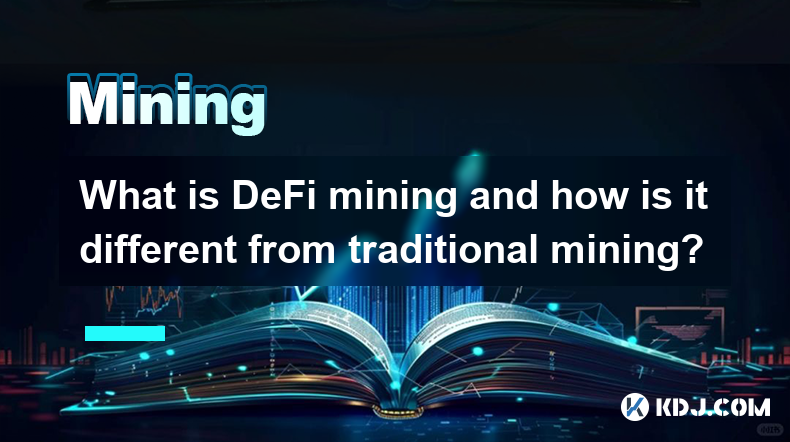
What is DeFi mining and how is it different from traditional mining?
Apr 02,2025 at 09:50am
DeFi mining, also known as yield farming or liquidity mining, is a process within the decentralized finance (DeFi) ecosystem where users provide liquidity to decentralized platforms in exchange for rewards. Unlike traditional mining, which involves solving complex mathematical problems to validate transactions and add them to a blockchain, DeFi mining f...
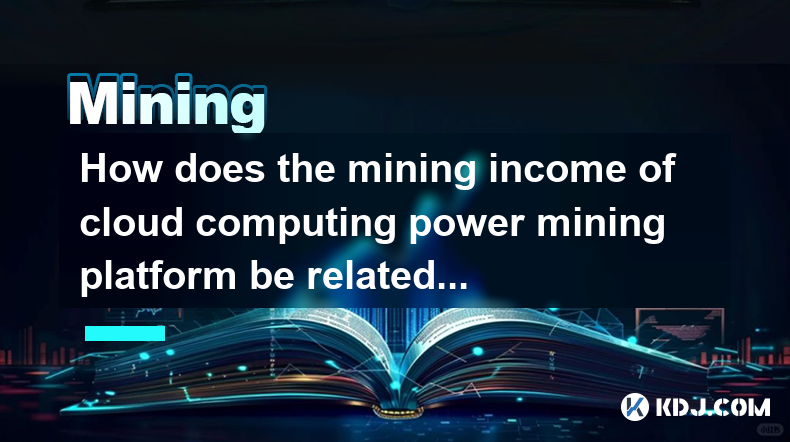
How does the mining income of cloud computing power mining platform be related to mining pool allocation?
Apr 02,2025 at 01:56am
The relationship between the mining income of a cloud computing power mining platform and the allocation of mining pools is a crucial aspect of cryptocurrency mining. Mining income is influenced by various factors such as the efficiency of the mining hardware, electricity costs, and the specific cryptocurrency being mined. However, the allocation of min...
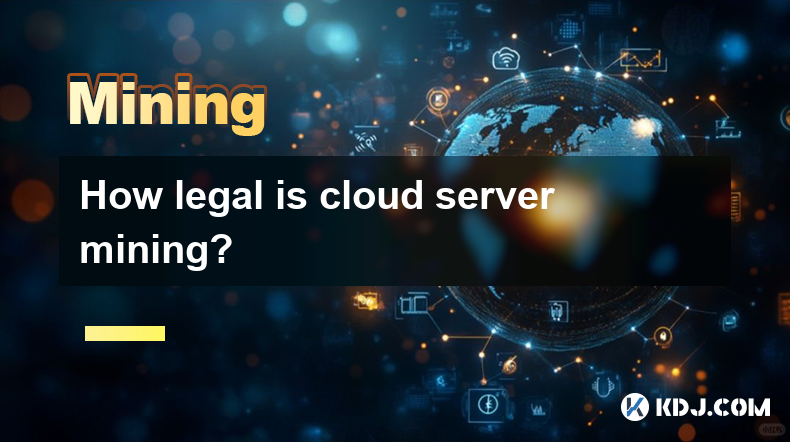
How legal is cloud server mining?
Apr 01,2025 at 08:08am
Cloud server mining has become an increasingly popular method for individuals and companies to participate in cryptocurrency mining without the need for expensive hardware and high electricity costs. However, the legality of cloud server mining can be a complex issue, as it varies by jurisdiction and depends on several factors. This article will explore...
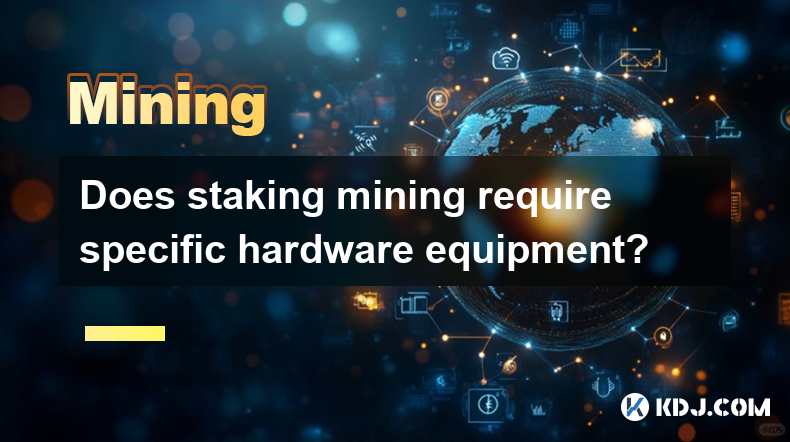
Does staking mining require specific hardware equipment?
Apr 02,2025 at 08:21am
Staking mining, often referred to simply as staking, is a process used by various cryptocurrencies to secure their networks and validate transactions. Unlike traditional mining, which often requires specialized hardware like ASICs (Application-Specific Integrated Circuits) or high-performance GPUs (Graphics Processing Units), staking typically does not ...
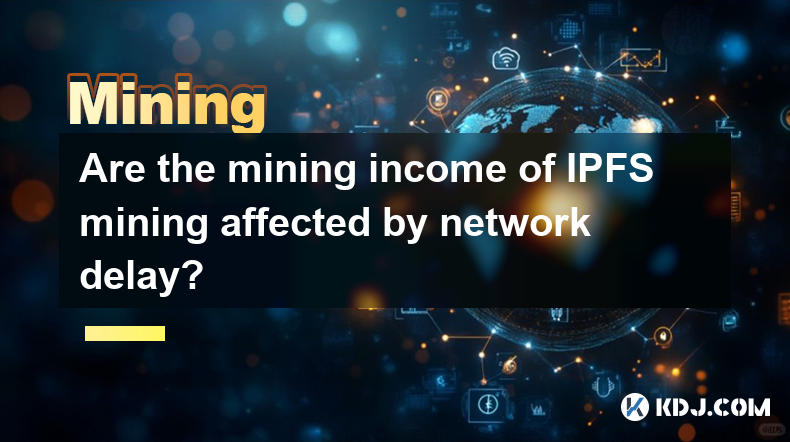
Are the mining income of IPFS mining affected by network delay?
Apr 01,2025 at 09:36pm
Are the Mining Incomes of IPFS Mining Affected by Network Delay? Understanding IPFS Mining and Network Delay's ImpactIPFS (InterPlanetary File System) mining, unlike Bitcoin mining, doesn't involve solving complex cryptographic puzzles. Instead, it focuses on providing storage and bandwidth to the network. Miners earn rewards for storing and sharing dat...
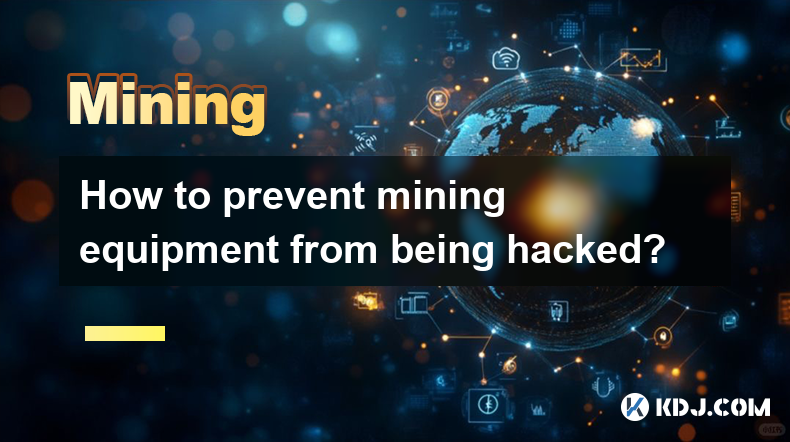
How to prevent mining equipment from being hacked?
Apr 01,2025 at 06:22am
Understanding the ThreatsCryptocurrency mining, while potentially lucrative, exposes your equipment to various cyber threats. These threats range from simple malware infections that steal your mining profits to sophisticated attacks that hijack your entire operation. Understanding these threats is the first step in effective protection. This includes r...

What is DeFi mining and how is it different from traditional mining?
Apr 02,2025 at 09:50am
DeFi mining, also known as yield farming or liquidity mining, is a process within the decentralized finance (DeFi) ecosystem where users provide liquidity to decentralized platforms in exchange for rewards. Unlike traditional mining, which involves solving complex mathematical problems to validate transactions and add them to a blockchain, DeFi mining f...

How does the mining income of cloud computing power mining platform be related to mining pool allocation?
Apr 02,2025 at 01:56am
The relationship between the mining income of a cloud computing power mining platform and the allocation of mining pools is a crucial aspect of cryptocurrency mining. Mining income is influenced by various factors such as the efficiency of the mining hardware, electricity costs, and the specific cryptocurrency being mined. However, the allocation of min...

How legal is cloud server mining?
Apr 01,2025 at 08:08am
Cloud server mining has become an increasingly popular method for individuals and companies to participate in cryptocurrency mining without the need for expensive hardware and high electricity costs. However, the legality of cloud server mining can be a complex issue, as it varies by jurisdiction and depends on several factors. This article will explore...

Does staking mining require specific hardware equipment?
Apr 02,2025 at 08:21am
Staking mining, often referred to simply as staking, is a process used by various cryptocurrencies to secure their networks and validate transactions. Unlike traditional mining, which often requires specialized hardware like ASICs (Application-Specific Integrated Circuits) or high-performance GPUs (Graphics Processing Units), staking typically does not ...

Are the mining income of IPFS mining affected by network delay?
Apr 01,2025 at 09:36pm
Are the Mining Incomes of IPFS Mining Affected by Network Delay? Understanding IPFS Mining and Network Delay's ImpactIPFS (InterPlanetary File System) mining, unlike Bitcoin mining, doesn't involve solving complex cryptographic puzzles. Instead, it focuses on providing storage and bandwidth to the network. Miners earn rewards for storing and sharing dat...

How to prevent mining equipment from being hacked?
Apr 01,2025 at 06:22am
Understanding the ThreatsCryptocurrency mining, while potentially lucrative, exposes your equipment to various cyber threats. These threats range from simple malware infections that steal your mining profits to sophisticated attacks that hijack your entire operation. Understanding these threats is the first step in effective protection. This includes r...
See all articles
























































































